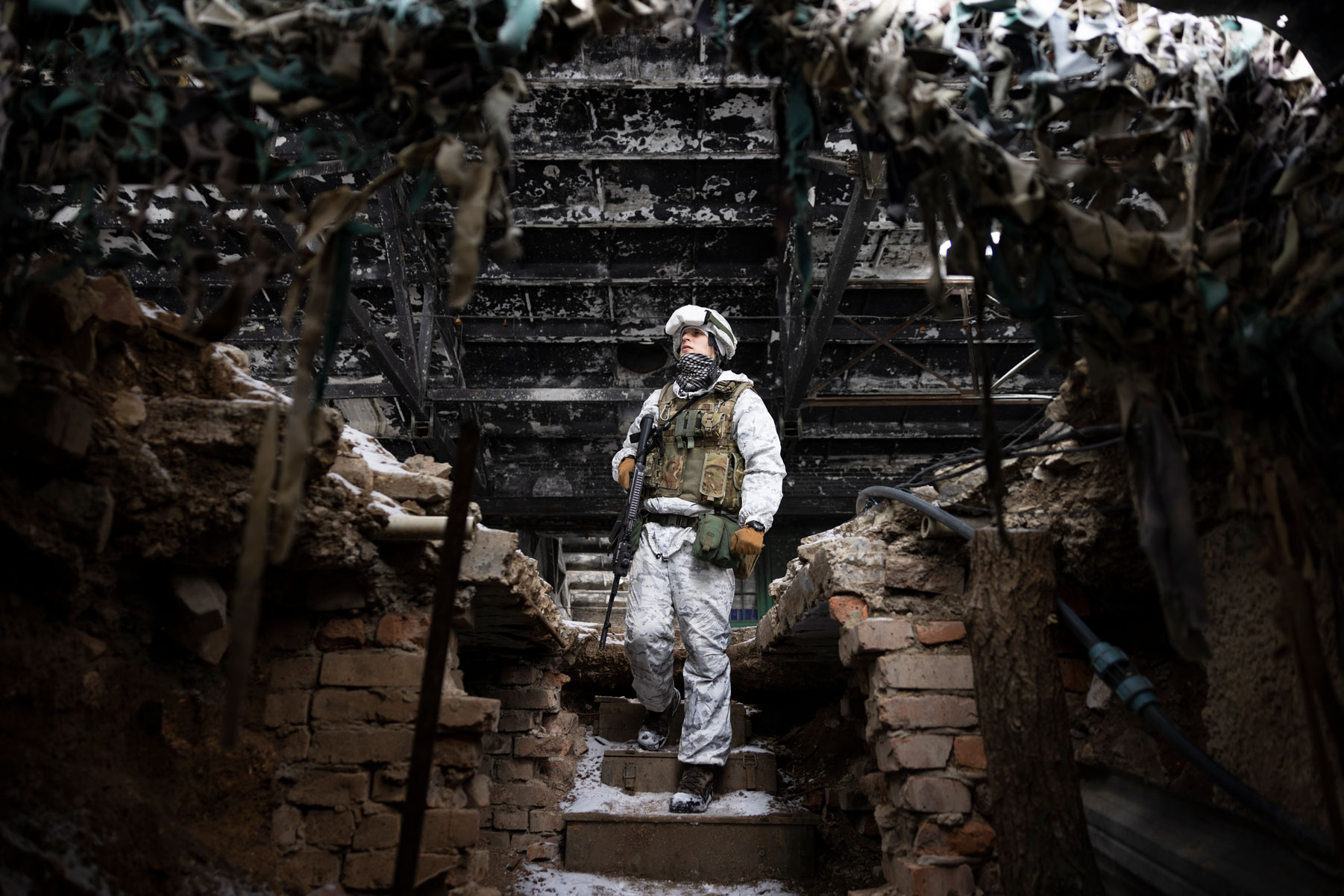We move quickly along the abandoned rail tracks just north of Donetsk. The soldier in the lead wears a snow-white uniform and waves that we should hurry. Fallen power lines run along the rails and a sign warns of mines. We walk nearly a mile and pass an abandoned and broken train stop. Suddenly, from an opening in the forest, we see on the horizon the worn gray high-rises inside what the enemy calls the Donetsk People’s Republic, or DNR.
This is the part of Ukraine that has been occupied by so-called separatists and conventional Russian military units since the spring of 2014. The Ukrainian army is positioned down the embankment and into the forest. This is one of the front lines of a war that has lasted for eight years and may at any moment explode again as President Vladimir Putin’s military forces continue to amass at Ukraine’s doorstep from three directions: here, the borderland region of the country’s industrial east; north from Belarus; and south from Russian-occupied Crimea.
In the forest, out of sight from the enemy’s position, the Ukrainian soldiers maintain their base. Simple huts and earthen fortifications made of logs and plastic are dotted everywhere. Smoke wafts into the sky from a wood-burning field stove; on a tree trunk the Ukrainians have attached a mirror for shaving.
From the huts, a dizzying network of ditches extends to observation posts and trenches. Everything is dug by hand with shovels and picks. We jump into one of the trenches and walk its length straight out of the forest. On the way we encounter a patrol that comes back from its shooting range. Olga, 37, is a grenade launcher. She’s greeted by happy shouts and hugs from her comrades. Today is her birthday, and this afternoon there will be a celebration in the bunker.
In a snow-covered field, where the down grows deeper the farther out we go, we find a shooting range of logs and sandbags. Jaroslav, 24, another soldier, sits scouting the field with a periscope, but he has to be careful: Anyone sticking their head out risks being shot by sniper fire from the DNR area, about a thousand yards ahead.
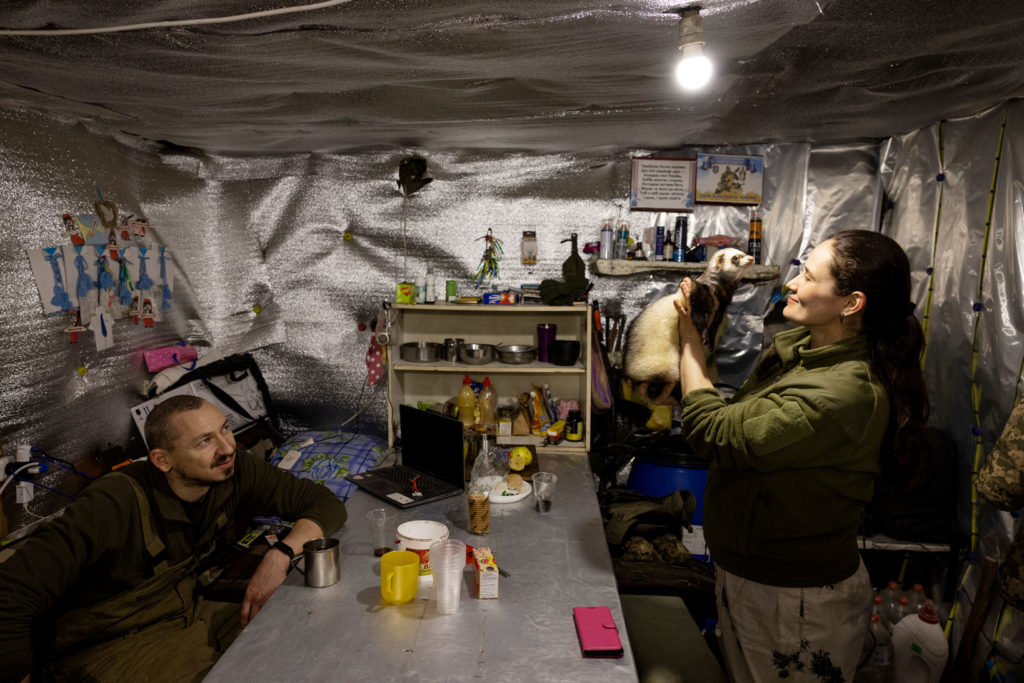
”Now it has been calm, but provocations happen basically every day,” Jaroslav says. He explains a common kind: The pro-Russian forces shoot randomly with a machine gun, waiting for the Ukrainians to return fire and give up their position. Then the snipers try to pick them off. Just last week, a Ukrainian soldier died that way around Luhansk, in the northern part of the front.
“You have to be on your guard at all times,” says Oleksii, 30, another soldier in the shooting range. “When you are constantly in the combat zone, you get used to it and start to relax. But you cannot relax. The safety vest is heavy, but you have to wear it; the helmet is heavy and uncomfortable, but you have to wear it. And you want to stretch and look out, but you cannot.”
Oleksii was once a television journalist, but now he’s a press officer with the Ukrainian army. Like a lot of his compatriots, he gave up his profession to fight in the war; more of them are preparing to do the same if Russia invades again.
Oleksii’s nickname is “Godzilla.” It used to belong to his father, who fell in the intense battle at the height of the war, in 2015, in the village of Zaitseve.
Jaroslav interrupts Godzilla to tell us he’s spotted through his periscope a truck and black jeep moving on the other side of the field. His company commander, Oleksander, takes a look. “We don’t know what they’re doing but it is something,” he says, another indication of the enemy’s increased mobilization in recent days.
Here at the front, the political situation in Kyiv, the threats emanating from Moscow and the frantic diplomacy in the West to stop another war don’t matter. “We have our task and we carry it out,” says Oleksander. “It’s clear that we are in the first line [of Ukraine’s defense] and will have to take the first and biggest blow.” International anxiety, he adds, amounts to nothing unless other countries join the fight, and Oleksander knows they won’t. Ukraine is on its own.
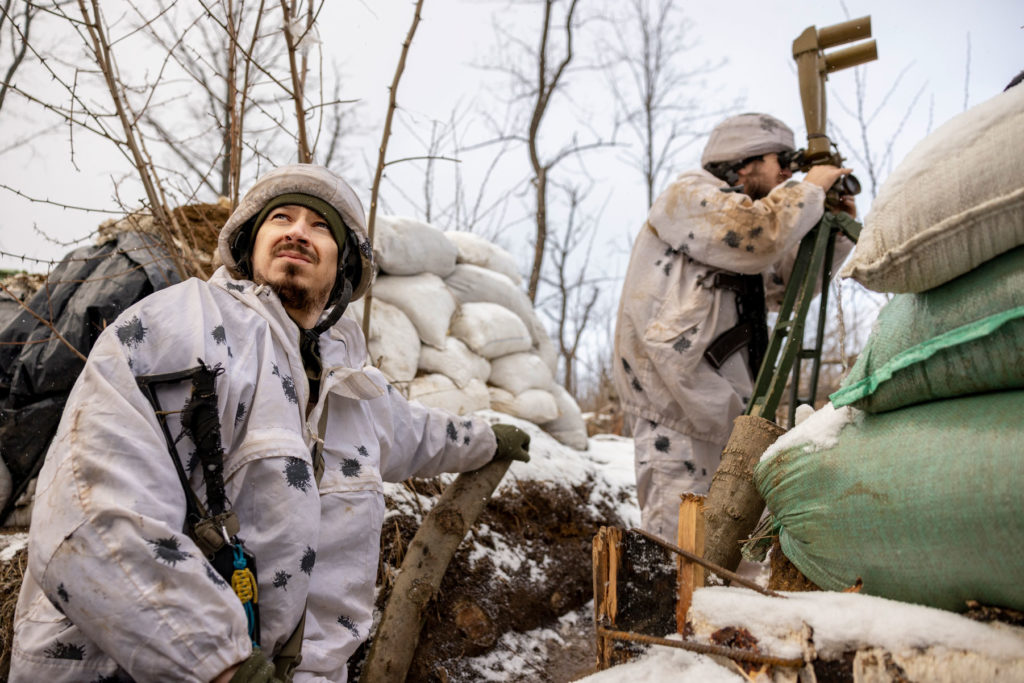
At dusk, we return to the base. In the bunker Olga plays with the company’s pet ferret, Zjuzja.
Before the war, Olga worked as a support teacher for deaf children. That was three years ago, before she joined her battalion, leaving two sons — 17 and 18 — behind. She sees them only a few times a year. One of them told her he wants to enlist himself.
Most of the houses along the village street in the old part of Avdiivka have been torn apart, the roofs of traditional small brick buildings collapsed long ago. Remaining walls are full of bullet holes. Once cultivated gardens have grown wild. The windows of one house that has remained standing have been nailed shut, and the outside is littered with sun-bleached teddy bears. The family that once lived here has long since fled.
Natalia, 57, has a disability pension. She’s one of the few Avdiikans who stayed in their house. With the support of a Ukrainian aid organization, she’s managed to replace the windows that shattered during previous fighting, though they may yet shatter again. Natalia remembers how scared she was when it started eight years ago. “We were at home and helicopters flew low over the house … to bomb the airport. It was terrible.”
Natalia’s neighbor’s house suffered a direct hit as the family huddled in the basement. They survived but left Avdiivka.
Some distance away, Oksana, 49, is struggling with the crank that lifts the bucket of water out of a well. On a small cart she has a jug she fills. As recently as October, a grenade landed in her neighbor’s garden and the explosion blew out Oksana’s kitchen window. She lives alone. Her 16-year-old son, Dimitri, attends a school in a city farther away from the fighting. Her daughter, 25, has married and has her own family. Oksana’s husband abandoned her and her children years ago.
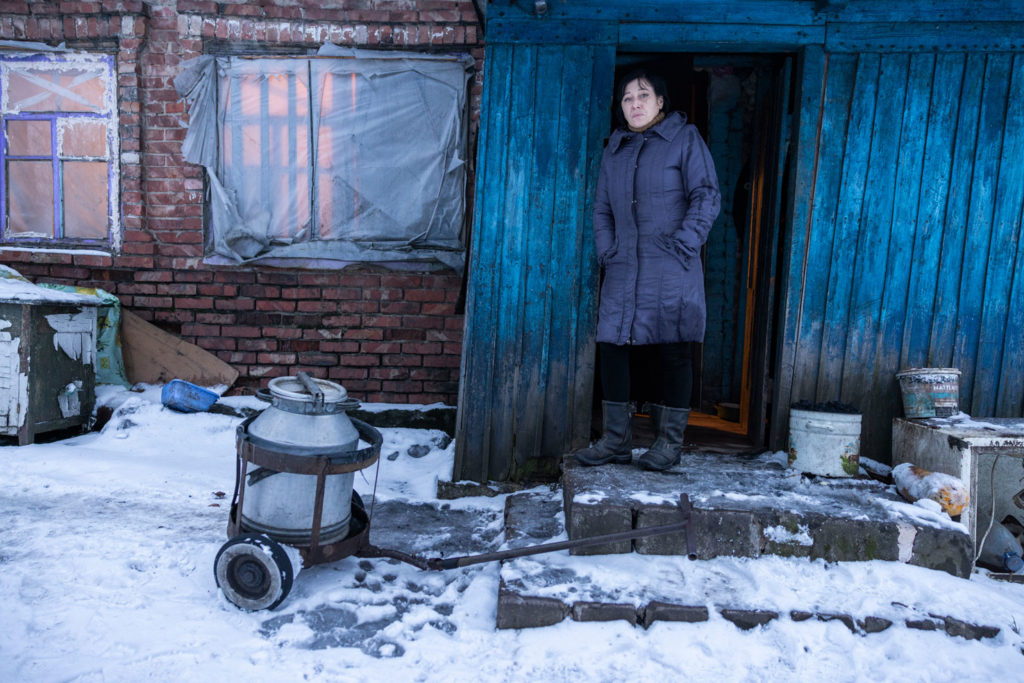
During the day, she loads coal at the large coke factory outside Avdiivka and earns a monthly salary of 7,000 hryvnia, $247. Somehow it’s enough for her and Dimitri.
The entire outer wall of Oksana’s house is cracked and several of her windows have been replaced with plastic. In the simple kitchen, she fires the stove with charcoal, tree branches and shells from walnuts that she gathered from the abandoned gardens. “I live in such a way that what God gives, so it will be,” she says. “I am a believer. Today I live, tomorrow I do not. Honestly I do not live, I just exist. I have no life. The young people are doing the right thing by leaving.”
In May 2014, the war in Donetsk began, and Oksana recalls standing in the garden when the teacher from Dimitri’s school called. “Come and get your son,” the teacher said. “The tanks are on their way here.” Dimitri was 8.
“All night we sat and waited for the tanks to come. But that day they never bombed. I actually do not even remember what day it was that it started.”
She shows us down a dark staircase to her basement. The air is cold and damp. The lamp is broken, and she lights our path with her cell phone. “I was here with my son all that summer, we lived here in the basement.” When the fighting was at its most ferocious, Oksana and Dimitri stood face to face with their backs to the doorframe, in case the roof caved in. She held a shovel in case she had to dig herself and her son out of rubble.
Oksana is tired of the war and angry about Ukraine’s politicians.
“Those up there,” she says, referring to Kyiv, “cannot agree on how to divide the country, and we send our children to war and die.
I’m not for anyone, although I live in Ukraine, and I love Ukraine. I do not understand politics, but I know one thing: Politicians do not send their own children to war. But should we suffer and die for them?”
Ljudmila, 73, comes out into the snow and shows off the remains of her son’s house. The red brick wall protrudes from an ash heap: In 2017, five grenades landed right in the house. The entire house went up in flames. Grenades have ruined Ljudmila’s life. A year earlier, in 2016, Ljudmila’s husband had his leg blown off by one that landed near their property. “When I woke up I wondered where my husband was. I found him in the garden really broken, without clothes and full of shards.” She and her son rushed him to the hospital, where surgeons amputated the damaged leg.
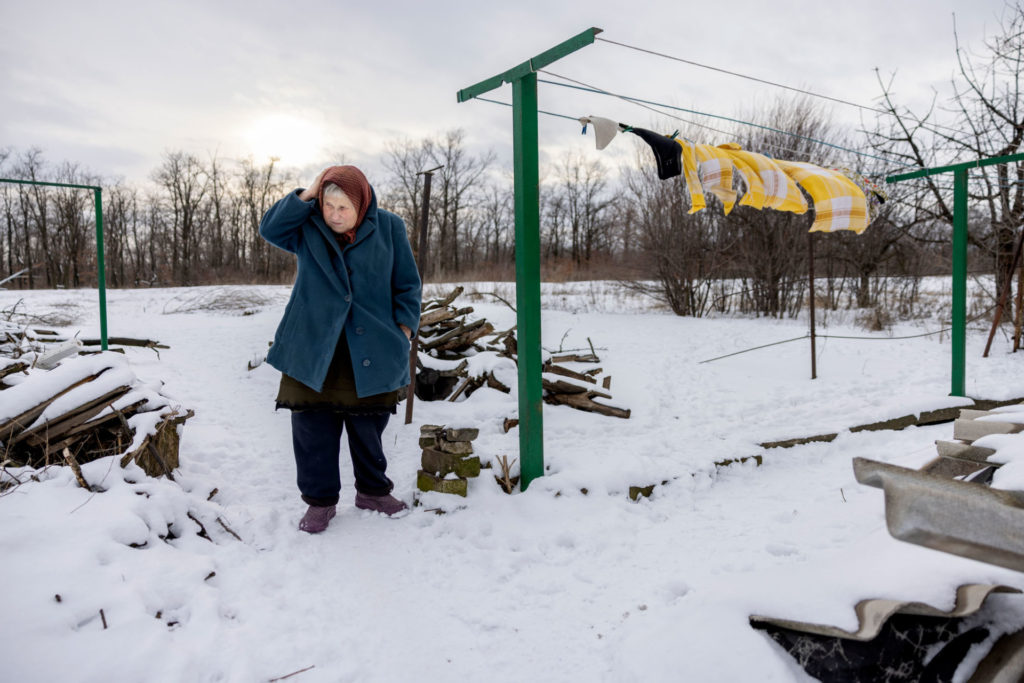
In a bombed-out factory in the Promzona area of Avdiivka, the rubber for car tires was once manufactured. That’s when the factory had a roof and its walls were not pocked by ammunition. A concrete block hangs in the last reinforcement bars and sways menacingly in the wind that blows through the facility, ushering in a whirlwind of snow.
From the rubber factory we descend into trenches to the Ukrainians’ outermost position, just 100 yards from the DNR forces. Even nature testifies to the fighting. Bare and charred tree trunks have lost all their branches and stand like skeletons against a bleak gray sky.
Cmdr. Ivan, our escort, is 30 years old and has served in the war almost continuously since it began. “Now it’s mostly calm,” he says, “but when it’s calm, we always think they’re doing something bad. If it’s totally quiet, it’s a little nervous.” He prefers it when they shoot, as they did daily in September and October.
We stop at an observation point on the road. Dennis, 20, peers out of his underground cave with his periscope. “It is a very difficult job for the soldiers, they are completely isolated from society and spend day after day and month after month here scouting out and waiting for someone to come,” says Ivan.
We continue down the trench and emerge on a small road that goes through an abandoned and shattered area with summer cottages. From the main post, right across from the enemy, the Ukrainians monitor activity with video surveillance. Anton, another grenade launcher, cooks solyanka soup on a wood stove for his fellow soldiers. In gratitude, they relieve him of the night shift.
The soldiers sleep underground, and when it rains everything turns to mud. Ivan compares it to World War I. “We have trenches, they have trenches, and between the trenches there are minefields,” he says, stirring the soup. “Neither their side nor ours cross the positions because whatever you do will cost a lot of blood.”
Back home in southern Ukraine, Ivan’s wife is expecting their third child. “My family is also a big responsibility, one of my sons has autism and my children need me, but I am still here. I see my family a total of two months a year.”
“How will it end?” we ask.
“I don’t know what’s going on in Putin’s head,” Ivan answers. “But we understand that [another invasion] can happen, and we understand that we cannot defend ourselves here forever.”
He is cleareyed about Ukraine’s prospects against Russia, admitting that he and his men can only “slow them down for a while.”
“History teaches us that people like Putin do everything as if the world were theirs,” Ivan says. “So up to the point when the whole world stops him, he can continue, as did Hitler.”
This dispatch is a collaboration between New Lines and Swedish newspaper Expressen.




